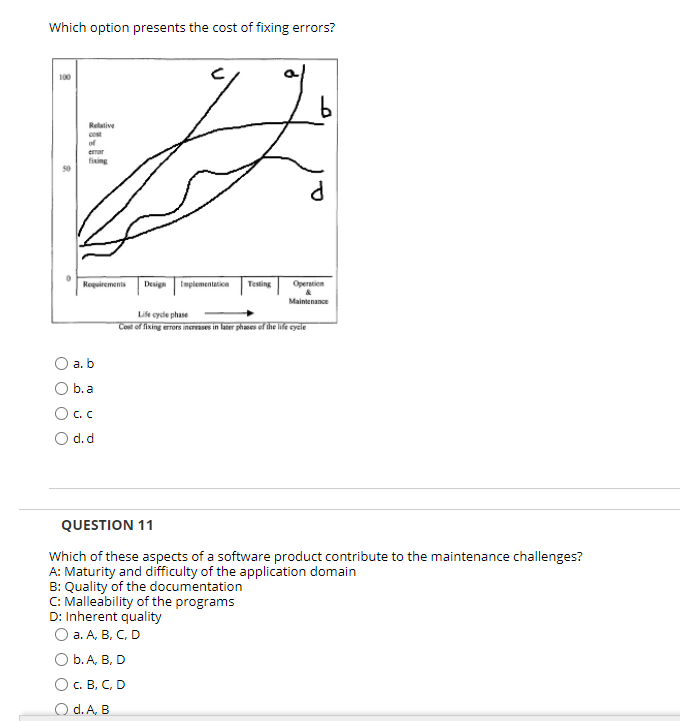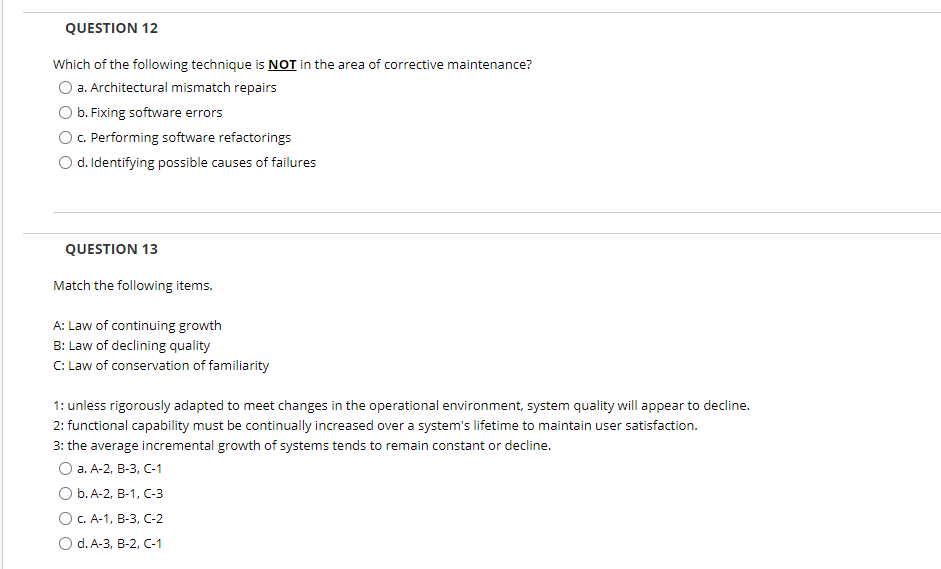Which option presents the cost of fixing errors? 100 Relative cost of emar fixing Roquirements Design Implementation Testing Operation Maintenance Life cycle phase Cost of fixing errors increases in later phases ef the life cycle a. b O b. a
Which option presents the cost of fixing errors? 100 Relative cost of emar fixing Roquirements Design Implementation Testing Operation Maintenance Life cycle phase Cost of fixing errors increases in later phases ef the life cycle a. b O b. a
Principles of Information Systems (MindTap Course List)
12th Edition
ISBN:9781285867168
Author:Ralph Stair, George Reynolds
Publisher:Ralph Stair, George Reynolds
Chapter13: Systems Development: Construction, Integration And Testing, Implementation, Operation And Maintenance, And Disposal
Section: Chapter Questions
Problem 5SAT: During user acceptance testing (UAT), the system development team tests the information system to...
Related questions
Question

Transcribed Image Text:Which option presents the cost of fixing errors?
100
Relative
cost
of
emar
fixing
Roquirements
Design
Implementation
Testing
Operation
Maintenance
Life cycle phase
Cost of fixing errors increases in later phases ef the life cycle
a. b
O b.a
О с.с
O d. d
QUESTION 11
Which of these aspects of a software product contribute to the maintenance challenges?
A: Maturity and difficulty of the application domain
B: Quality of the documentation
C: Malleability of the programs
D: Inherent quality
О а. А, В, С, D
О b.А, В, D
Ос. В, С, D
O d. A, B

Transcribed Image Text:QUESTION 12
Which of the following technique is NOT in the area of corrective maintenance?
a. Architectural mismatch repairs
b. Fixing software errors
C. Performing software refactorings
O d. Identifying possible causes of failures
QUESTION 13
Match the following items.
A: Law of continuing growth
B: Law of declining quality
C: Law of conservation of familiarity
1: unless rigorously adapted to meet changes in the operational environment, system quality will appear to decline.
2: functional capability must be continually increased over a system's lifetime to maintain user satisfaction.
3: the average incremental growth of systems tends to remain constant or decline.
а. А-2, В-3, С-1
О Б. А-2, В-1, с-3
О с. А-1, В-3, С-2
O d. A-3, B-2, C-1
Expert Solution
This question has been solved!
Explore an expertly crafted, step-by-step solution for a thorough understanding of key concepts.
Step by step
Solved in 2 steps

Knowledge Booster
Learn more about
Need a deep-dive on the concept behind this application? Look no further. Learn more about this topic, computer-science and related others by exploring similar questions and additional content below.Recommended textbooks for you

Principles of Information Systems (MindTap Course…
Computer Science
ISBN:
9781285867168
Author:
Ralph Stair, George Reynolds
Publisher:
Cengage Learning

Fundamentals of Information Systems
Computer Science
ISBN:
9781305082168
Author:
Ralph Stair, George Reynolds
Publisher:
Cengage Learning

Principles of Information Systems (MindTap Course…
Computer Science
ISBN:
9781285867168
Author:
Ralph Stair, George Reynolds
Publisher:
Cengage Learning

Fundamentals of Information Systems
Computer Science
ISBN:
9781305082168
Author:
Ralph Stair, George Reynolds
Publisher:
Cengage Learning